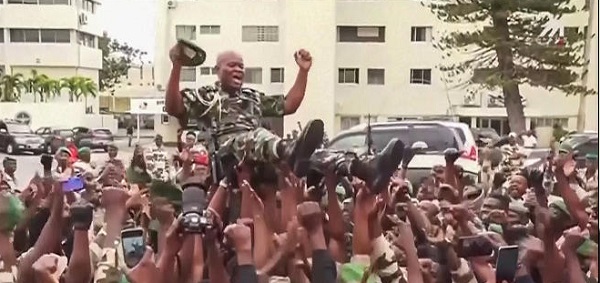
Setting the pace for democracy in Africa: Ghana must stand tall
A problem genuinely shared is usually said to be half solved. This might have a Western basis but is similar to the Akan adage which is literally translated to mean that until you visit another’s farm, you may mistakenly assume that you are the only one unfairly treated by the weeds.
Advertisement
This is why Ghanaians must remain united and have faith in the growing democratic structures, despite its imperfections.
Reports of another military takeover in Gabon amidst the determination to end military interventions in West Africa by the sub-regional group Economic Community of West African States (ECOWAS) are most astonishing and confusing.
Attempts to theorise the whole saga brought to memory a case that got my class divided one day at the Department of Political Science, University of Ghana, Legon. “Your loved one is sick and it is diagnosed medically that he has 24 hours to die unless a certain drug is administered. The only pharmacy that had the drug was unwilling to accept part payment for the balance to be settled the next day. Will you break into the pharmacy at night and save your loved one and face the consequences of theft or will you stay faithful to the law and watch your loved one die?” This was the case.
Changing constitution
Theoretically, military intervention in politics is globally considered archaic and unwise. Besides, soldiers have not demonstrated superiority in governance, historically. This explains the universal condemnation anytime soldiers assume the reins of power.
This is no longer funny, hence calling a spade a big spoon is deceitful and will not help matters. The case of the family dynasty in Gabon, where Ali Bongo changed the constitution to run for another term and reportedly won the disputed August 26, 2023 election, which the soldiers said ‘lacked transparency and credibility’, should be analysed within the context of intersubjectivity.
The circumstance leading to the overthrow of long-term Burkinabe ruler Blaise Campaore was similar. He changed the constitution to seek another term, which had been his trademark. Parliament looked on so the youth first attacked Parliament and the rest is what we see today.
Lest we forget, Robert Mugabe was overthrown under similar circumstances and the just-ended election in Zimbabwe is reportedly not different from what transpired in the disputed re-election of now-deposed Ali Bongo. I am sure the story of Cote d’Ivoire and Senegal are equally not favourable. But do we sincerely call these democracies? It may even be frustrating when the economic fortunes keep deteriorating with clear signs of abuse of office with impunity, where the powers that be care a hoot about the basic tenets of democracy.
Other Trending Stories
If Western media reports are anything to go by, then the general mood in these disturbing countries is that the people feel the only thing to lose is the chains with which these ‘democratic autocrats’ have bound them. The unpopular support for the soldiers by some may as well be because they represent a welcomed change from incompetent, corrupt rulers.
These notwithstanding, rebellion against democracy in such countries is akin to the Biblical sins of divination, even if the sins of such leaders are as stubborn as adulatory.
The extent to which military coups in one country can influence, in some fashion, the occurrence of coups in other countries is what Richard Li and his friends call coup contagion theory. But the truth remains that there is no evidence of a contagious wave; perhaps what we have today is simply the coincidence of already coup-prone countries.
Ghana
This is where Ghana must stand up by showing to the rest of the continent that we believe in democratic competition and cooperation, irrespective of our challenges. We have faith in our electoral system to produce leaders who represent the will and wish of the masses every four years. We believe in the sanctity of the judiciary to administer fairness when it comes to what matters. We trust the police service to guarantee internal peace and security and not succumb to the dictates of elected or appointed leaders whimsically and capriciously. We trust in our Parliament and believe they will not pass laws that will eventually lead to bitter consequences since apartheid was executed lawfully!
There is no place like home. We must, therefore, rally behind our government by proffering genuine alternative suggestions on how to improve upon areas where there are shortfalls. We should avoid malicious accusations and allegations that poison the system. The government must also desist from questionable actions that invite rumours with the capacity to cause disaffection in the people.
A show of some of these is enough to make Ghana a standard reference for the rest of the sub-region and continent at large, to want to stay faithful to the marriage to democracy.
The writer is a lecturer at the Department of Political Science, University of Education, Winneba




